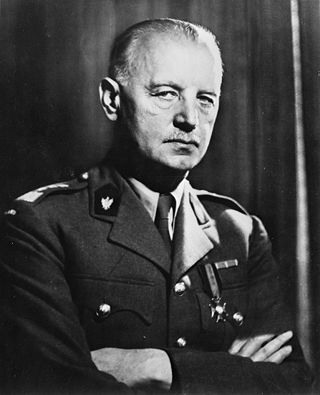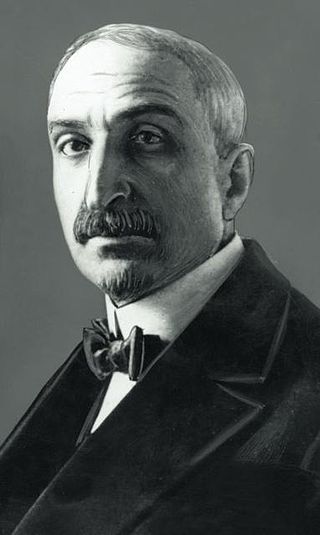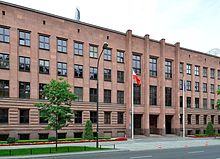
Stanisław Wojciechowski was a Polish politician and scholar who served as President of Poland between 1922 and 1926, during the Second Polish Republic.

Władysław Eugeniusz Sikorski was a Polish military and political leader.

The Polish Workers' Party was a communist party in Poland from 1942 to 1948. It was founded as a reconstitution of the Communist Party of Poland (KPP) and merged with the Polish Socialist Party (PPS) in 1948 to form the Polish United Workers' Party (PZPR). From the end of World War II the PPR led Poland, with the Soviet Union exercising moderate influence. During the PPR years, the centers of opposition activity were largely diminished, and a socialist system was established in the country.

Szymon Askenazy was a Jewish-Polish historian, educator, statesman and diplomat, founder of the Askenazy school.

Józef Adam Zygmunt Cyrankiewicz was a Polish Socialist (PPS) and after 1948 Communist politician. He served as premier of the Polish People's Republic between 1947 and 1952, and again for 16 years between 1954 and 1970. He also served as Chairman of the Polish Council of State from 1970 to 1972.

The Polish Socialist Party is a socialist political party in Poland.

Edward Bolesław Osóbka-Morawski was a Polish activist and politician in the Polish Socialist Party (PPS) before World War II, and after the Soviet takeover of Poland, Chairman of the Communist-dominated interim government, the Polish Committee of National Liberation formed in Lublin with Stalin's approval.

Aleksander Józef Skrzyński was a Polish politician, from Zagórzany, Gorlice, Galicia, who served as the 13th Prime Minister of Poland from 1925 to 1926.

The Provisional Government of the Republic of Poland was created by the State National Council on the night of 31 December 1944.

The Provisional Government of National Unity was a puppet government formed by the decree of the State National Council on 28 June 1945 as a result of reshuffling the Soviet-backed Provisional Government of the Republic of Poland established by the Polish Workers' Party through inclusion of politicians from the close political sphere of Stanisław Mikołajczyk, the former prime minister of the Polish government-in-exile based in London. Inclusion of the latter group provided an excuse for the Western allies to approve tacitly the fait accompli of Poland becoming part of the Soviet sphere of influence, and to legitimise the Warsaw government while withdrawing their recognition of the Polish government-in-exile.

The Ministry of National Defence is a office of government in Poland headed by the Minister of National Defence. It is responsible for the organisation and management of the Polish Armed Forces. During the Second Polish Republic and World War II it was called the Ministry of Military Affairs. Ministry budget for 2022 was 140 billion PLN.

Aleksander Warma VR I/3 was an Estonian navy officer, diplomat and painter.

The Ministry of Foreign Affairs of Armenia (MFA) is a state body of executive power, which elaborates and implements the foreign policy of the Government of Armenia and organizes and manages diplomatic services. The MFA acts accordingly to the Constitution and legislation of Armenia. The Ministry of Foreign Affairs coordinates the activities of the executive power bodies of the Republic in the international arena. Since 2021, Ararat Mirzoyan has been the Minister of Foreign Affairs of Armenia.

The Ministry of Foreign Affairs of the Republic of Lithuania is a governmental body of the Republic of Lithuania that shapes the national policy, and organises, coordinates, and controls its enforcement in the following areas: foreign affairs and security policy: international relations, economic security, foreign trade, protection of the rights and interests of the Republic of Lithuania and its persons and entities abroad; coordination of European Union membership; representing the Republic of Lithuania abroad diplomatic and consular relations, diplomatic service, Lithuanian national and diplomatic protocol, international relations; the policy of cooperation of the Republic of Lithuania; strengthening of expat connections with Lithuania.

Denmark–Poland relations refers to the bilateral relations between Denmark and Poland. Relations between the two countries date back to the Middle Ages, while modern diplomatic relations were established on 8 September 1919. During the 20th century, relations were turbulent but amicable. The two countries moreover maintained a maritime border dispute until 2018 when it was delineated.

Poland–Uruguay relations are foreign relations between Poland and Uruguay. Neither country has a resident ambassador. Both nations are members of the United Nations.

The Ministry of Foreign Affairs of Estonia is a Cabinet-level governmental agency in Estonia in charge of conducting and designing Estonian Foreign policy.

Diplomatic relations between Brazil and Poland were first established in 1920. Over 800,000 Brazilians are of Polish descent making Brazil the second country with the largest Polish community abroad. Both nations are members of the United Nations.

Kajetan Dzierżykraj-Morawski was a Polish politician, diplomat, and journalist. He served as the Minister of Foreign Affairs of the Republic of Poland and the "Polish High Commissioner of Danzig".






































